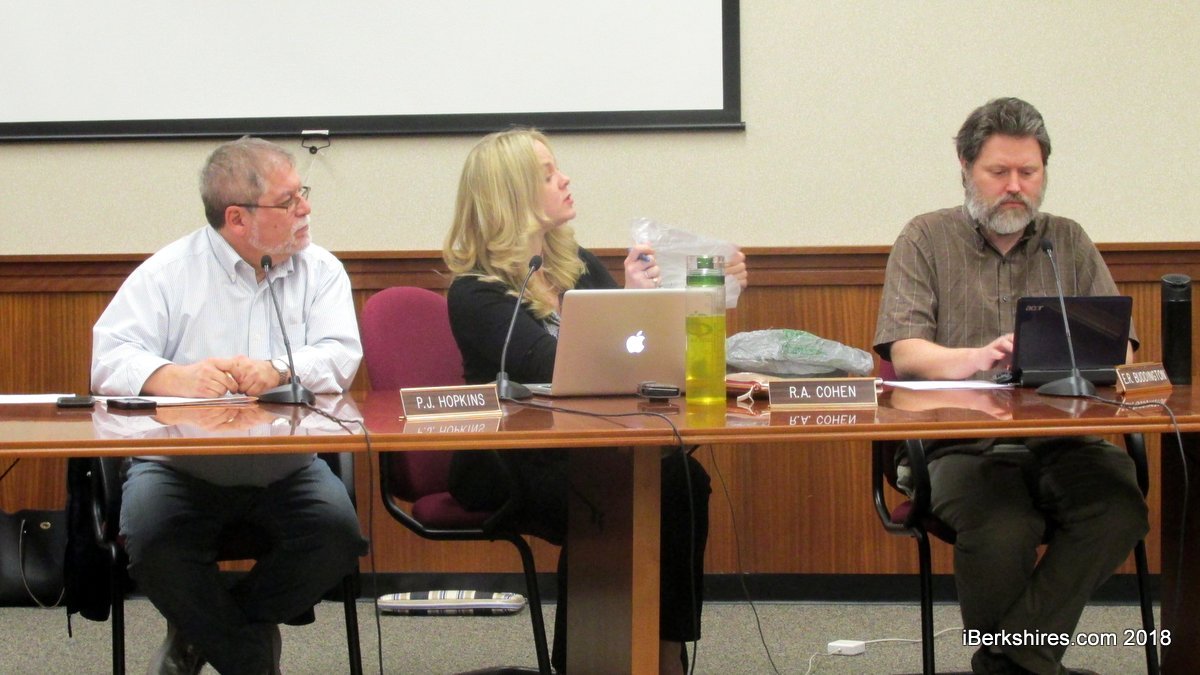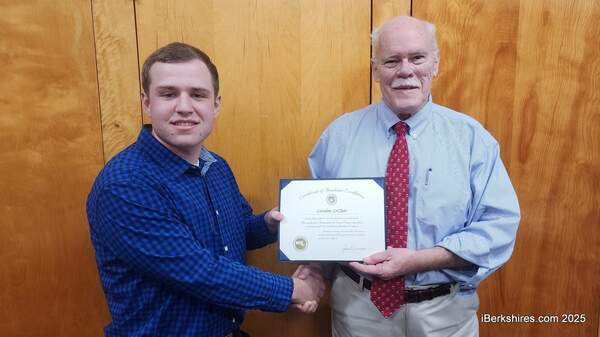
North Adams Committee Finding Little Business Support for Bag Ban

The committee also wants to remind consumers that some stores, like Stop & Shop here, have places to deposit used plastic bags.
The committee, comprised of Chairman Eric Buddington and members Rebbecca Cohen and Paul Hopkins, discussed what they had heard at last week's meeting from a number of residents and the results of a brief online survey.
Cohen had developed the survey through surveymonkey.com to gather input from businesses. At last week's meeting, a pizzeria owner had indicated owners might be leery of expressing their opinions in public.
She had received about 17 responses by Tuesday but not every business responded to every question.
"I'd say we're seeing strong opposition to a bag ban," Cohen said. "We do have a few people saying they would support efforts to reduce the use of bags, so I think there's an overwhelming support of reduction of use of bags."
She said 74 percent were for efforts on reduction but only 29 percent supported an outright ban.
The survey asked what type of business, whether they use plastic bags, how many bags they went through a day, how they feel about the ban or on imposing a fee.
Cohen said just over half were restaurants and of the total number of businesses, only a third said they didn't use plastic.
One statistic she found "pretty alarming": More than 90 percent that responded used less than 50 bags a day but just under 10 percent used more than 200.
"It was pretty interesting to see there was nowhere in between," she said. "Most people used less than 50 bags and then you had 7 to 8 percent using more than 200. And that wasn't the big box stores at all."
More than half were strongly opposed to an outright ban and about 60 percent were opposed to imposing any kind of bag fee. (The attorney general's office in 2015 found Williamstown had no constitutional authority to impose a fee.) Another nearly 12 percent were unsure about a ban, which Cohen read as perhaps wanting to be more educated on the alternatives.
"I think that what this is showing us, from looking at data a little more in-depth, is that people are open to discuss," she said. "This is not going to be a quick process and right now eliminating the use ... some of the small businesses we're seeing here, they're strongly opposed to that."
Cohen said she wanted to get the survey out to more businesses, and Hopkins offered to reach out to the North Adams Chamber of Commerce for help in reaching more businesses. For the larger chain stores, she expected they would have to go through regional managers or corporate headquarters.
Buddington said he had informally spoken with employees at the two of the grocery stores.
"They have had to deal with that in other places so it would not be a big change for them," he said. However, he had also spoken with Wild Oats Co-op Market in Williamstown on what that store had done since the town had implemented its bag-ban.
The disposable bags acceptable under the Williamstown bylaw cost 5 to 10 cents apiece, whereas the general plastic bags run 2 to 3 cents, he was told.
Cohen said she, too, had done some research on current bags being used, pulling out samples from Walmart, Stop & Shop, Ocean State Job Lots, Dollar Tree and some produce bags. All the bags were No. 2, meaning they are made of high-density polyethylene and have a lower risk of leaching.
"I have done just a small amount of research to be a little more in tune with what the recycling numbers on the bags mean because a lot of people at the meeting last week and what I was hearing on Facebook and in speaking with people, they thought the bags in the stores could be recycled," she said. "Which is true. What that means, though, is that they can be used to make recycled materials so they can be broken down to make additional products. ...
"They cannot be disposed of properly in the landfill or if they're left out in the soil, they won't decompose."
The committee members did note that a number of the stores accept used bags back for recycling.
City Councilor Jason LaForest, who attended the meeting, said the price of recyclables had dropped dramatically. He had heard on NPR that it costs thousands of dollars to recycle a ton of the bags but they only sell for tens of dollars. (Science Advance journal last year found 79 percent of all plastics is litter or sitting in landfills.)
"The question on the table is are they actually recycling them or disposing them elsewhere," he said.
The committee determined that it wanted more input from businesses and another meeting focused on the business side before turning to consumers' thoughts.
"I need to hear from more people, I've been hearing things and it's very much split," Hopkins said.
Resident Robert Cardimino questioned why the ordinance was being considered at all.
"Is this just a feel-good thing? If you're trying to accomplish recycling and everything else you've got all these other plastic bags that don't fall under this category," he said. "It's like pulling a quill out of a porcupine and saying he's a housecat."
The ordinance, submitted by Buddington, states its purpose is to reduce usage of the bags because of they are a pollutant that burden waste collection facilities, are a danger to marine animals, clog drainage systems and require crude oil to be manufactured.
Instead, businesses and consumers would be steered toward paper, reusable, biodegradable and/or marine degradable bags. The health inspector would be the enforcer and fines would range from $50 to $200.
Cohen said the solution could be encouraging businesses and people to think before using or offering a bag, developing a reusable bag program similar to that of Adams, and making sure people know there are dropoffs for recycling.
"We have some very environmentally conscious people and I'm one of them as well and if I can reduce our carbon footprint for the longevity of the world, in a very small way," she said. "It may be a small step toward at least starting a movement."
Tags: bag ban, general government committee, recycling,















